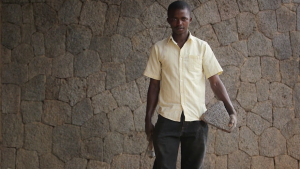From the Series
Nicole Moyo, a recent architecture graduate from Carleton University in Canada, presents an innovative solution mobilising communities in informal settlements and providing them with a means to create their own water, energy and waste systems. Energy is collected from human waste, which is then turned into fertiliser and can be used to encourage community gardens.
The thesis project is called Ukubutha, which means to “gather” in Zulu. The Zimbabwean-born South African student designed the project for Pretoria’s Mamelodi informal settlement, but hopes to adapt it wherever the infrastructure is needed.
Moyo admires the vibrancy of townships and densely populated areas, and considers the inclusion of this atmosphere the success of her project. She shares her vision, “The open public spaces are imagined to be full of vibrant energy where one is able to teach, cook, perform and conduct economic activities such as markets.”
The design empowers lower-income communities with a means of creating their own water, energy and waste systems, instead of waiting on government.
“Ukubutha is about creating sustainable environmental communities”, Moyo says.
The project works with onsite recycling and resource recovery. The design features traditional huts, which will bring the community together and reflect their own traditions and cultures.
Sanitation facilities inside the huts collect a supply methane gas, a renewable fuel source produced by human waste. The gas is collected onsite through an anaerobic digestion process, and can be used for a variety of applications.
The rest of the waste goes to a connected facility that produces fertiliser. This in turn encourages community gardening and self-sufficiency. Moyo designed the system to rely on nature and gravity, so that little additional expertise and infrastructure would be necessary.
The project allows the communities to become independent and gives them ownership of their infrastructure, which they build and maintain themselves. Extra space in and around the construction encourages community interaction and outdoor skills training to further enrich the community.
Moyo says, “I believe that engaging people in all stages gives them a sense of pride and ownership.”
Her independent and do-it-yourself attitude is evident, “How can I empower less fortunate communities without having to depend on government sourced service delivery?”
Read more
Musana Carts: Providing clean energy to Kampala's micro businesses













